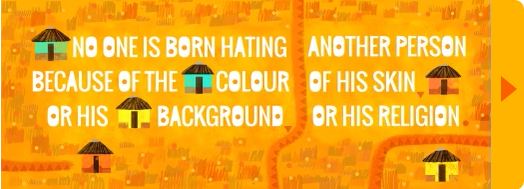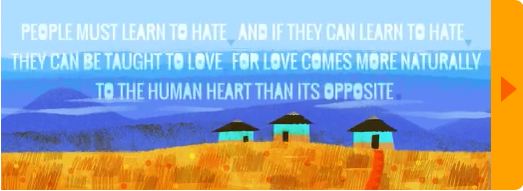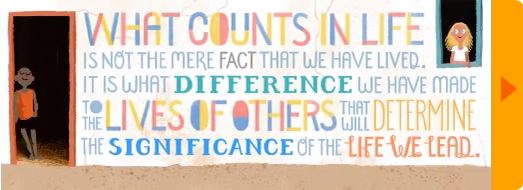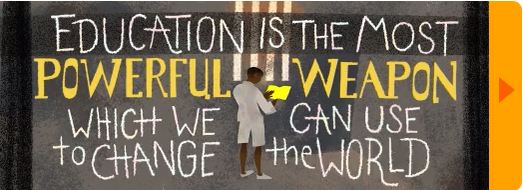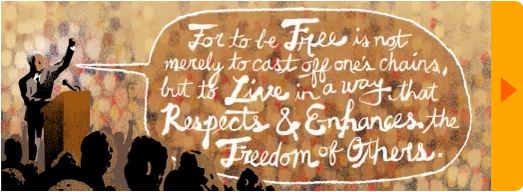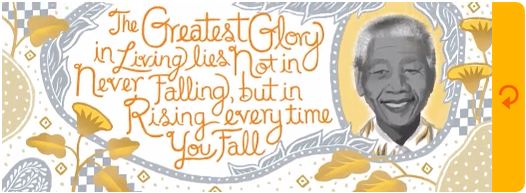|
Today's Google Doodle was in honor of Nelson Mandela. And as usual with Google, it was done incredibly well. But it's when things are so appealing to our visual enjoyment and emotions that we might do well to be even more attune to how to interpret it in light of God's Word. Now I need to be clear up front: this post is not intended to attack Nelson Mandela in the least.(1) It is, however, intended to provide an analysis of the message Google presents in honor of Mandela (at least in part from his own words) and how that message is at polar opposites with the message God provides in His Word. So if you examine with me the beautiful doodles of Google compared to God's Word, I hope you'll discover with me that as at many other times, there is an important clash of worldviews - that is - an important clash of understanding of truth, that is at stake here.  So what is so opposite the Christian message in today's doodle? Let's take a look. After clicking on the arrow to the right of Nelson Mandela we're taken (in a Pixar-esque fashion) to the next doodle, which I believe is taken straight from Mandela's autobiography. The Doodle Analysis In case you can't see the text, it says: "No one is born hating another person because of the colour of his skin or his background or his religion." But is that true according to God (who does indeed know all things)? Let's just compare what His unchangeable true Word has to say: For without cause they hid their net for me; For behold, they lie in wait for my life; More in number than the hairs of my head They encircle me with words of hate, They hate me without cause David says. So whether it's because of the colour of his skin or his background or even his religion(2), David truly is being hated - even to the point of attempts to murder him. Of course the astute reader will notice that the quote says "No one is born hating..." And that takes us to the next beautiful (but drastically wrong) doodle message. Again, if you can't see the text it says: "People must learn to hate. And if they can learn to hate they can be taught to love. For love comes more naturally to the human heart that its opposite." While I don't know that that logic is air tight, regardless, we must compare that message with what God Himself says concerning the human heart and, in its "natural" state, its propensity to love or hate:
Man, in his natural state, is not prone to love but to hate (Ti. 3:3). And not only that, a propensity to hate and to sin is not something he learns. It is something he is born with. So what's the remedy? Let's follow the story.... This text says: "What counts in life is not the mere fact that we have lived. It is what difference we have made to the lives of others that will determine the significance of the life we lead." I can certainly see an aspect of goodness in this. There is a sort of sentiment to love your neighbor here (Mt. 7:12; Gal. 5:14). But as we have seen above, that cannot come from ourselves (Mk. 7:21-22). But what really counts in life can be found in this: And this is eternal life, that they know you the only true God, and Jesus Christ whom you have sent. Knowing the Lord. That is what counts. And when we know the Lord Jesus Christ our heart is changed to truly love our neighbors and make a good and godly difference in their lives and ours (Mt. 22:37-39; 1 Jn. 3:16-18, 4-6). But without knowing the Lord first, we are no better off than in our "natural" state (Ti. 2:11-14, 3:3-8). But let's continue the story... The text here reads: "Education is the most powerful weapon which we can use to change the world." I actually agree with this in theory. After all, making disciples of all nations entails changing the world through teaching disciples (education) to observe all that the Lord has commanded (Mt. 28:18-20). But education must been seen in its true light - that the very beginning and foundation of all education is the fear of (and trust in) the Lord Jesus Christ (Prv. 1:7). For it is in Him and Him alone that all true knowledge finds its meaning (Col. 2:3). My fear is that most people will see this - education - as a task of the state rather than parents and churches discipling their children. And that leads to the next doodle... This image reads: "For to be free is not merely to cast off one's chains, but to live in a way that respects and enhances the freedom of others." Again, this seems to be very agreeable if we have a common understanding of what freedom means and from where it comes. Like a previous doodle message, we're in agreement in an aspect of not just living for ourselves but for loving our neighbors as well (Mt. 7:12; Gal. 5:14). However, freedom in the Christian worldview is probably different than what this message is espousing. I'm pretty sure this message is speaking of a form of political freedom and (in light of the previous doodle) freedom from ignorance (which again I would assume entails state education - which will undoubtedly teach the humanism espoused in these messages). But the Christian understanding of freedom is not freedom as in ability to pursue whatever it is we want (Gal. 5:13). It's the powerful freedom from the Old Covenant shadows (Gal. 4:9-10, 5:1-2) and our bondage to sin (Jn. 8:34-36; Rom. 6:6). But, when we become Christians we don't shed our slavery shackles completely. We trade in our bondage to sin and the Old Testament shadows for our bondage to Christ and a new, fuller life in Him (Rom 6:16, 22-23). We are slaves to Christ - for what else could it mean when we call Him our Lord, which means master? (see 1 Cor. 12:3). And in that light, we are absolutely to live in a way, not that vaguely "respects and enhances the [undefined] freedom of others," but in a way that shows the world what true freedom is (Gal. 2:20, 6:14). So what is the outcome of being a slave to Christ? It's not this: Text: "The greatest glory in living lies not in the never falling, but in rising every time you fall." Again, certainly there are some elements of truth to that. It seems to assume man will fall in his endeavors (which Biblically speaking is inevitable). But how does man rise when he falls? The text seems to indicate he raises himself. But that just is not what our Lord reveals in regard to our human condition. God must raise us! [Please read the whole thing; but the bold words sums up the message] And you were dead in the trespasses and sins in which you once walked, following the course of this world, following the prince of the power of the air, the spirit that is now at work in the sons of disobedience—among whom we all once lived in the passions of our flesh, carrying out the desires of the body and the mind, and were by nature children of wrath, like the rest of mankind. But God, being rich in mercy, because of the great love with which he loved us, even when we were dead in our trespasses, made us alive together with Christ—by grace you have been saved--and raised us up with him and seated us with him in the heavenly places in Christ Jesus, so that in the coming ages he might show the immeasurable riches of his grace in kindness toward us in Christ Jesus. God is the one who raises us up in our fallen state and in our continued falling this side of glory! Read through pretty much any of the Psalms, and it is never the Psalmist who picks himself up; but he cries to the Redeemer Lord, Who hears this lowly sinner's prayer and redeems him Himself. God is the hero! And what is more to the point, the greatest glory in living is not picking ourselves up when we fall, but trusting ourselves to the only One who can truly pick us up. For it is only when Christ is in us and uses His own power to Himself pick us up that we understand that glory. The greatest glory in living is knowing the gospel truth, that our glory is not yet at its fullest. Our glory shall be revealed at the proper time (Rom. 5:2, 8:20-25). Our hope in life is anticipating and longing for that glory to be revealed. For this is the mystery of the gospel: that Christ is in His chosen believers, and that He is the hope (anticipation) of glory yet unseen (Col. 1:27). Concluding Remarks Here is a comparison of the doodle message and God's word:
When it comes down to it, it comes to this: One view says we're born in a state that loves, and that we need and can educate others to love. That when we fail or fall we need to pick ourselves up and continue our conquest of love - and that's how we overcome the world. Another view, the Bible, says we're born in a state that hates and that we need to be regenerated by the Holy Spirit to belief in the gospel of Jesus Christ. He is the one who then lives in us and graciously changes us so that we do love and that we love truly. We then teach that love to others with that same gospel as the foundational starting point (or else the ones we're teaching won't be able to love at all). When we fail or fall, we cannot pick ourselves up, but we must cry out to the only One who can redeem us and Himself pick us up. Our glory is in trusting in Him and awaiting for His glorious appearing. And that's how we overcome the world: For everyone who has been born of God overcomes the world. And this is the victory that has overcome the world—our faith. Who is it that overcomes the world except the one who believes that Jesus is the Son of God?" Jesus is the answer! Amen. (1) Time does not permit a recount of his place in history, his personal faith or theology, and what he accomplished in Africa. For more about that, there is an interesting article (though there are parts in it that I would see as a questionable understanding of Christian faith and theology) on Christianity Today, which you can find here. (2) I think you'll find in the context of those Psalms (for which you can find the full texts here: Psalm 35:1-28, 59:1-17, 69:1-36, 109:1-31) the main reason for hating David was indeed his "religion" or his devotion to Jehovah (the LORD). But what was really at the heart of and fuel for their hatred was their own sin.
|
Categories
All
|
